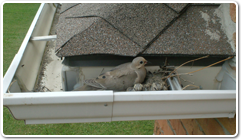Is your roof or building exterior covered with pigeon droppings?
Do you find yourself rushing to dodge pooping pigeons every time you enter your building?
Do you find that everywhere you walk you seem to be kicking at pigeons with your feet?
Pigeons are actually one of the worst of all Toronto’s urban bird pests and, where their numbers go unchecked, can be just as serious a health hazard as rats and other vermin.
If you think the pigeon numbers flocking around your building are getting a little out of control, call in the experts at Sande Wildlife Control.
With our effective and humane bird control techniques we will eliminate your pigeon problem and deter them from returning anytime soon.
We have successfully vanquished out-of-control pigeon populations in both downtown Toronto and many other suburbs of the GTA, including:
|
|
|
Take a quick look at www.homestars.com (Toronto’s independent online source for information on local contractors) and see what our previous clients think of our pigeon control and pest deterrent services. (We are proud to say we have been given a 10/10 rating!)
Or for more information, please call Sande Wildlife Control on 416-902-6249, contact us online, or e-mail: st.wildlifecontrol@gmail.com.
What makes pigeons such a terrible urban pest?
Accumulated pigeon droppings that collect in vast quantities in areas where pigeons congregate can host a varied assortment of toxic bacteria, fungi, viruses and other pathogens that can seriously threaten the health of humans who come into breathing range of it.
Pigeon’s collected droppings erode millions of dollars of metal structures (such as ventilation and airconditioning shafts, etc), stonework, wood, masonry in general – in fact, pigeon urine is so acidic that it will eat its way through many types of construction material and will easily reduce the durability of your roof by half.
Pigeon droppings can also be a particularly unpleasant hazard for people using entrance doors under roofs where pigeons like to roost, and to those who sit to eat lunch on park benches under trees where pigeons gather waiting to finish up your leftovers.
Pigeons also harbour their own select varieties of fleas and other blood-sucking parasites that will soon go in search of a new source of nourishment once they fall off or somehow become detached from their host.
In addition, pigeons can adapt to roosting on just about any type of man-made structure because their short squat legs and flat hind and front toes enable them to both walk and perch so they can readily make use of different types of level and branch-like horizontal surfaces.
This unvarying ability to adapt to many different types of urban environments, together with the fact that pigeons are fearless of people, breed prolifically and can eat a wide and varied diet make them a significant – and expensive – urban wildlife problem.
How Sande Wildlife Control can help?
Our pest control experts know that pigeons are non-migratory creatures of habit that have daily and seasonal routines and like to stay relatively close to where they were born.
This means that once we have been to your site and seen where your pigeons like to roost, feed and breed we can set up an effective elimination and deterrent programme to remove existing pigeons and to prevent them returning in the future.
This may involve the use of:
- Setting up capture netting in the pigeons’ predominant flight paths
- Setting up of humane live traps
- Removal of eggs
- Removal of all sources of food
- Limiting pigeons’ access back to nesting sites
- Prevention of access to all possible future nesting sites.
- Electrification of perching and roosting areas.
- Use of falcons and other birds of prey to scare away pigeons from open spaces.
Exactly which combination of methods we use depends very much on each individual site where pigeons are presenting a problem.
For a free-of-charge quote on how much we estimate it will cost to eliminate your pigeon pests and deter them from returning any time soon, please contact Sande Wildlife Control of Toronto by calling 416-902-6249, contacting us online, or e-mailing us at: st.wildlifecontrol@gmail.com.

